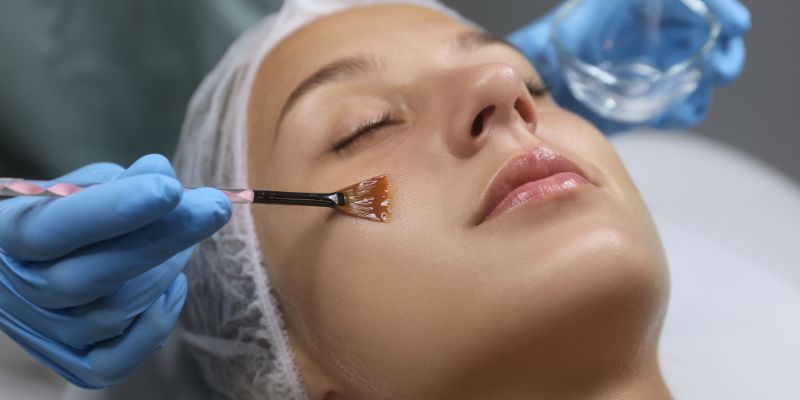Chemical peels may appeal to skincare enthusiasts for their ability to rejuvenate the skin and improve its appearance. These procedures use specially formulated solutions to target specific skin concerns and promote a smoother and more even complexion. Here is more information on chemical peels, the process, their benefits, and who may be a suitable candidate for this treatment:
What Is a Chemical Peel?
A chemical peel is a skin-resurfacing treatment that involves applying a chemical solution to the skin to exfoliate its outer layers. This controlled exfoliation process helps remove dead skin cells, encouraging the growth of new, healthier skin. Chemical peels are categorized into three types based on their penetration depth: superficial, medium, and deep. Each type is customized according to the individual’s skin type, concerns, and desired results.
Superficial peels target the outermost layer of the skin and are often used to address mild skin imperfections. Medium peels penetrate deeper into the skin and may address concerns such as fine lines and uneven skin tone. Deep peels, which reach the innermost layers, are typically used to target more pronounced skin issues.
What Does the Process Involve?
The process begins with an initial consultation. A skincare specialist assesses the individual’s skin type, concerns, and medical history to determine which peel is most appropriate. Based on this assessment, they select the chemical solution. During the procedure, the chemical solution is applied evenly to the skin’s surface.
This application may cause a mild tingling or warm sensation, depending on the strength of the peel. The solution is left on for a specific duration before being neutralized or rinsed off. After the treatment, the skin begins to peel or flake as it sheds the treated layer. This stage reveals fresh, rejuvenated skin over several days or weeks, depending on the peel’s intensity.
Post-peel care is recommended to protect the newly treated skin. It typically includes staying hydrated, using gentle cleansers, and applying broad-spectrum sunscreen to minimize sun exposure. The skin may require moisturizing to maintain its balance and reduce any potential dryness.
What Are the Benefits?
This treatment offers numerous benefits that enhance the skin’s appearance. They help improve skin texture by reducing roughness and promoting a smoother, more even surface. Fine lines and wrinkles may appear minimized, and the treatment can also address hyperpigmentation and sun damage, contributing to a more uniform skin tone.
For individuals struggling with mild to moderate acne, chemical peels may help unclog pores and reduce acne-related inflammation. The enhanced exfoliation process can also diminish the appearance of acne scars, making it a beneficial option for those with post-acne concerns. Repeated treatments may help maintain skin elasticity.
What Makes a Good Candidate?
Chemical peels are suitable for individuals seeking to improve specific skin concerns or maintain a more youthful appearance. Individuals with mild to moderate skin imperfections, such as fine lines, uneven skin tone, sun spots, or acne scars, may benefit the most from this treatment. They are also a good option for those who have realistic expectations about what the procedure can achieve.
Seek Expert Guidance Today
This treatment can transform your skincare routine by offering effective solutions for various concerns, from improving texture to addressing discoloration. Understanding the procedure and the potential benefits will help you make an informed decision about whether this treatment is right for you. If you’re thinking about getting a chemical peel, consulting a qualified skincare professional is an excellent first step. They can guide you through the process, suggest the appropriate type of peel, and provide tailored recommendations to help you achieve your skincare goals.









